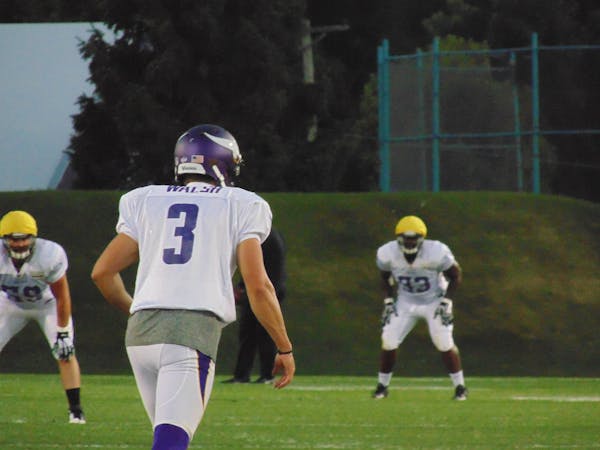Being organized and focused has never been more important for an NFL head coach.
Back in the good, old days for coaches — and bad, old days for players — practice time in full pads runneth over. And players rarely changed teams, so continuity ranneth over as well.
In 1960, the year before the Vikings arrived in the NFL, the Dallas Cowboys were the league's expansion team. They trained at St. Olaf College here in Minnesota. They escaped the Texas heat, but not the grind of what was then a typical NFL training camp.
Dallas' rookies reported to camp July 3. There were six preseason games, per the norm at the time, and starters typically played in all of them. Veterans reported 2 1/2 weeks before those exhibition games began.
All practices were padded and lasted 2 1/2 to three hours. And there were two of them a day for weeks on end.
Under the modern collective bargaining agreement, only one training camp practice per day can be in pads. The other is essentially a walk-through. Players get days off, and their offseason is strictly regulated to prevent contact.
The OTA — organized team activity — was born a few years back. There are phases to the OTAs, and all of them are voluntary. It takes until the third phase for coaches to be able to instruct players on the field in actual full-team football activities, albeit non-padded. The Vikings, like every other team, are going through that this week.
With so little time with the players — many of whom are new arrivals — it's vital for coaches to not waste a single teaching moment, to be in tune with mood of the team, the tone of the practice, and to set things straight immediately if anything jumps off the rail.
My sense watching the Vikings work an OTA is coach Mike Zimmer knows full well the value of every minute. First of all, there's no loitering. Secondly, the team practices with speed and urgency.
Sometimes, the young guns mistake the up-tempo work for an excuse for initiating contact outside what's acceptable for a morning workout in mid-May. Cornerback Keith Baxter was that over-anxious young gun on Wednesday at Winter Park. Zimmer stopped practice, huddled the team, barked some direct, colorful and effective language and put the young men back to work.
"They've never really practiced with the rules that we have, so it's just reminding them every day how to do it the right way," Zimmer said. "They'll get it eventually."
Feeling the pulse of the team's mood also is important with so little time together on the practice field. Zimmer said he felt his players stray a little bit Tuesday before he had to redirect them as a group. His sense was they were starting to think too much about being 11-5 in 2015 than 0-0 in 2016.
"This team knows how to work," Zimmer said. "I think they like to practice, I think they like to compete, they like football and it's really a credit to them. But really, anything that we did last year really doesn't matter and I think they understand that – most of them do. I had to remind them a little bit [Tuesday]. We came out and we were a little bit just not like us. We were kind of cocky and talking smack to one another, so I had to remind them who we were."

Minnesota Sports Hall of Fame: A class-by-class list of all members

This retired journalist changed professional wrestling from Mankato

